Ron DeSantis Could Have Been Florida’s Teddy Roosevelt
In 2018, when Ron DeSantis was elected to the Florida governor’s office, EcoRight Floridians were ecstatic at the prospect of finally having a governor who would put climate change at the forefront of his agenda — particularly after the “don’t say climate change” terms of Rick Scott — and work across the aisle to find solutions.
A year into his governorship, DeSantis issued a five-page executive order outlining his ambitious climate agenda. In his executive order, DeSantis allocated $2.5 billion to protect waterways and restore the Everglades, as well as the appointing both a chief science officer and a chief resilience officer (the first in the nation) to help prioritize environmental research efforts and climate mitigation concerns facing Florida.
On his way to positioning himself as Florida’s first climate-focused Republican governor, he even called for funding to address “the challenges of sea level rise, intensified storm events, and localized flooding” in his first budget proposal.
These first term acts earned DeSantis a reputation in the EcoRight for being environmentally friendly and climate conscious in a practical, market-based way. Some of us were looking forward to seeing what he’d do with a second term, especially as hurricane after hurricane impacts our communities, red tide plagued our shores and flooding from King Tides became routine. But priorities have shifted for DeSantis.
As Floridians seek higher ground, DeSantis is seeking higher office. And to do so, he has to cater to the shrinking sliver of the Republican base that remains mired in their refusal to “believe” climate change is a serious crisis. In an effort to pick up these votes (sadly, the only way candidates seem to think they can win a national primary these days), he abandoned his science-first and climate agenda and shifted his tone on climate.
One glaring inconsistency during his tenure has been DeSantis’ reluctance to acknowledge the impact of human activities on climate change. Despite overwhelming scientific evidence supporting this conclusion, he chose to sidestep this critical issue, seemingly to avoid alienating a portion of his political base.
During the first presidential debate when the candidates were asked to raise their hands if they thought human behavior caused climate change, DeSantis demurred, saying, “We’re not school children, let’s have the debate,” and then ignored the question all together.
Instead of running on the environment and climate agenda that once defined his tenure, which would not only appeal to the growing EcoRight constituency but would help the GOP fix its problem with the younger generation of voters who consider climate change a ballot-box issue, he is blatantly catering to more polarizing and attention-grabbing issues, in a race to the bottom with the climate-denying former president, who has all but sewn up the nomination anyway.
His previous record would have distinguished DeSantis as different, as a trailblazer, as a man attempting to return the Republican Party to the conservation roots embodied by Rough Rider Teddy Roosevelt. Unfortunately, his shift lumps him in with the rest of the pool.
He missed an opportunity to use his experience leading the state most vulnerable to climate change. Governor DeSantis had the opportunity to show the art of the possible. However, DeSantis has allowed his political ambitions to trump his initial climate focus — to the detriment of the Sunshine State, the Republican Party and the nation.
Despite mounting evidence and the urgent need for action (the call is coming from inside the house, sir), Governor DeSantis is working diligently to downplay his previous commitment to a science-first approach to climate change. As the climate crisis intensifies, Floridians can only hope that their leader will refocus his attention on the pressing environmental issues facing us, rather than pursuing short-term political gain.
The future of Florida’s environment — and honestly, the GOP — depends on him reorienting his priorities. Or someone else coming along to do it.
Written for and published on The Invading Sea

